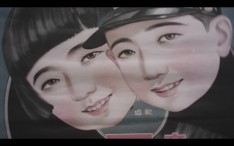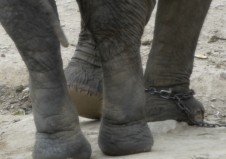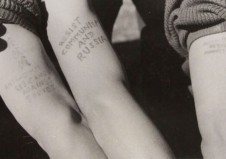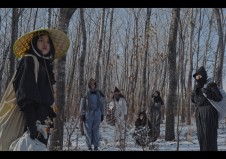Restoring Memory: East Asian Narratives in Non-Fiction Shorts

The Shadow Lands Yonder | 虛無鄉遠 by Lee Kai-Chung
Los Angeles Filmforum presents
Restoring Memory: East Asian Narratives in Non-Fiction Shorts
Sunday August 10, 2025, 1:30 pm
At 2220 Arts + Archives, 2220 Beverly Blvd., Los Angeles CA 90057
Tickets: $15 general, $10 students/seniors, free for Filmforum members
Link: https://link.dice.fm/Jdb2285fdafc
Curated by Sorry Not Sorry
Zoom Q&A after the screening with directors Changmin Lee and Lee Kai-Chung, moderated by Brandy Wang, curator
Community Partner: GYOPO-LA
Marking the 80th anniversary of the end of World War II, the program, Restoring Memory: East Asian Narratives in Non-Fiction Shorts, showcases three non-fiction essay films by Changmin Lee, Kyuri Jeon, and Lee Kai-Chung that explore the layered interplay of history, memory, and identity in East Asia’s wartime legacies.
The three selected films examine the migrating and displaced bodies and locate memories in embodied experiences, artifacts, and affects. Employing diverse experimental filmmaking methods—engaging public and familial archives, carrying out ethnographic fieldwork, and reenacting historical temporalities—these films critically address global colonial histories, inter-Asian militarism, and bodily and psyche manifestations of ideological conflicts. Together, these works constellate a reimagination of East Asia as a site of historical flux, exposing East Asia’s internal entanglements with larger geopolitical forces while recentering local memories and subjectivities within its dynamic cultural and historical landscapes. This program is an effort to foster dialogue and reimagine “Asianness” and its dynamic cultural contexts through the evolving praxes of non-fiction filmmaking.
Sorry Not Sorry is a platform for new and emerging filmmakers to share and reimagine the meanings of “Asianness”. Founded in 2021 as a volunteer-run and not-for-profit platform, Sorry Not Sorry is rooted in communal care, and is dedicated to supporting works from various positions and stories about Asian and Asian diasporic lived experiences. https://sorrynotsorryshorts.com/
Brandy Wang is an independent film curator/programmer based between Los Angeles and New York. She is the Co-Director of Programming at CineCina Film Festival and the founder of Sorry Not Sorry, a platform dedicated to amplifying underrepresented Asian and diasporic voices through experimental and boundary-pushing short films. Her curatorial practice engages with experimental film, indigenous and ethnographic media, and transnational art practices that interrogate migration, hybridity, and displacement. Wang holds an M.A. in Media, Culture, and Communication from New York University, where her research centered on media representations of immigration, gender, and sexuality.

Dear Elephant | 디어 엘리펀트
Dear Elephant | 디어 엘리펀트
Dir. Changmin Lee, South Korea, 2019, 24:01, Korean with English subtitles
Commissioned to commemorate the 60th anniversary of Korea-Thailand diplomatic relations, the documentary Dear Elephant follows footsteps of Keongson Lee, a nearly forgotten film director who is recognized as the first Korean to settle in Thailand. Through the exchange of letters between the director Changmin Lee and Keongson Lee’s daughter Muttita Fletcher (Ryeo Lee), the film pieces together Keongson Lee’s life as a refugee during an era of historical tragedy. By examining these personal correspondences, Dear Elephant reveals how history and personal memory intertwine, shedding light on Lee’s experiences and the legacy he left behind. It revisits a significant chapter in the shared past of Korea and Thailand, while honoring an individual whose story has remained largely unknown.
Changmin Lee is a South Korean documentary director, producer, and film scholar. He studied Catholic theology and documentary filmmaking, later earning a Ph.D. in literature for his apocalyptic research on Béla Tarr’s second-period films. After training to become a Catholic priest for nine years, he chose filmmaking instead. His documentaries, including Memories of a Photographer, Candle in the Wave, and Dear Elephant, explore Korea's modern history, democracy, and the interplay between memory and representation. He also produced Burmese on the Roof, Dance, and Hydrangea, focusing on migration, gestures in film history, identity, and social reflection.

The Flesh-Witness | 산증인 | 活證人
The Flesh-Witness | 산증인 | 活證人
Dir. Kyuri Jeon, Korea, United States, 2021, 13:34, Korean, English, and Chinese with subtitles
The Flesh-Witness re-edits military footage from the National Archives and Records Administration in the United States, documenting prisoners of war (POWs) from the Korean War. The footage documents the capture and control of POWs by the UN Command at the Geoje-do POW Camp in the 1950s. During the “voluntary” repatriation process, many POWs were coerced into being tattooed with anti-communist slogans and symbols to prove their ideological allegiance and secure their return to their homelands. The film features hand-traced drawings of these tattoos and accompanying accounts in three languages, forming a constellation of historical markers inscribed on countless bodies.
Kyuri Jeon is a South Korean artist and filmmaker based in New York. Jeon works with video, essay, drawing, and installation to explore time, vision, and its implications for the future. Through the lens of intersectionality, she questions ongoing transnational discussions about identity, feminism, decolonization, and cultural translation. Jeon’s work has been featured internationally at KINDL – Centre for Contemporary Art, Berlin; MassArt Art Museum, Boston; Mimosa House, London; Konsthall C, Stockholm; Artists’ Moving Image Festival, Glasgow; Festival Film Dokumenter, Yogyakarta; Women Make Waves, Taipei; and DMZ International Documentary Film Festival, Seoul. She is a recipient of a Contemporary Visual Art Award at AHL-T&W Foundation and an award winner at the Asian Shorts Competition at Seoul International Women’s Film Festival. Jeon holds BFA from Korea National University of Arts and MFA from the University of Pennsylvania and Seoul National University.

The Shadow Lands Yonder | 虛無鄉遠
The Shadow Lands Yonder | 虛無鄉遠
Dir. Lee Kai-Chung, Hong Kong, 2022, 39:39, Japanese with Chinese and English subtitles
The Shadow Lands Yonder is a collaborative research-based work by Hong Kong artist Lee Kai-Chung and Japanese artist Isaji Yugo. The project centers in Manchuria in the early twentieth century, a time of massive population displacement driven by war colonisation as the Qing empire collapsed and a new nation was still in the making. The agricultural emigrates became an alternative instrument of colonial policy, developing a new world, making ‘home’ in a foreign land with fertile black soil, abandoning their origins and rediscovering their identity. The emigrates were trapped in a cycle of ‘longing – developing – leaving – stagnation – repatriation – being rejected’, their lives drained in the shadow lands, while they had belonged to neither Manchuria nor homeland that they longed for.
Based on historical records and memoirs, Lee reconstructs a seven-day time period with video and creative writing, re-enacting the psychological changes and conflicts of the refugees during the long journey of escape and repatriation, thus exploring the complex process of identity ‘transition’ under the sudden change of politics. Through a participatory approach to filming, Lee draws on the subjectivity and creativity of the local participants to bring to life the sense of emptiness inherent in a multi-layered historical and collective consciousness, where the confusion about identity intertwines between past and the present.
Lee Kai-Chung performs artistic research on the entanglement of geopolitics, coloniality and its affective fallout. From his early explorations of postcolonial archival systems for historiography, Lee has developed an archival methodology that extends to interdisciplinary research-based creative practices, including critical fabulation, publishing, archives-making and public engagement. Lee was awarded the Consortium for the Humanities and the Arts Southeast England (CHASE) doctoral studentships from the Arts and Humanities Research Council (AHRC), and the 18th Busan International Video Art Festival <Selection 2024> prize in 2024; Honourable Mention in Sharjah Biennial 15 and Taoyuan International Art Award respectively in 2023; The Robert Gardner Fellowship in Photography from Peabody Museum of Archaeology and Ethnology of Harvard University in 2022, he received Altius Fellowship from Asian Cultural Council in 2020; the annual Award for Young Artist (Visual Arts) from Hong Kong Arts Development Council in 2018, and WMA Commission (Transition) in 2017.
